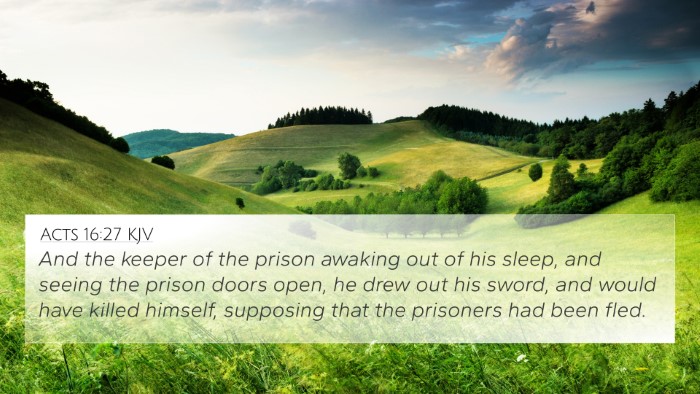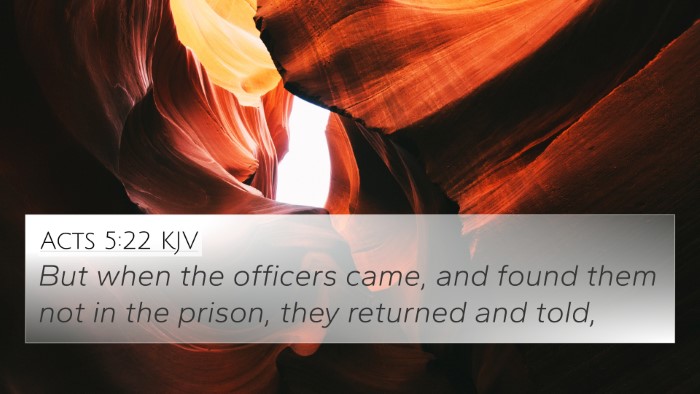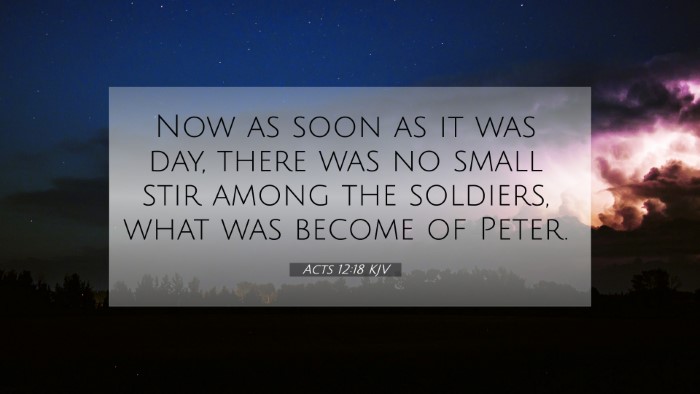Old Testament
Genesis Exodus Leviticus Numbers Deuteronomy Joshua Judges Ruth 1 Samuel 2 Samuel 1 Kings 2 Kings 1 Chronicles 2 Chronicles Ezra Nehemiah Esther Job Psalms Proverbs Ecclesiastes Song of Solomon Isaiah Jeremiah Lamentations Ezekiel Daniel Hosea Joel Amos Obadiah Jonah Micah Nahum Habakkuk Zephaniah Haggai Zechariah MalachiActs 12:18 Similar Verses
Acts 12:18 Cross References
Now as soon as it was day, there was no small stir among the soldiers, what was become of Peter.
Uncover the Rich Themes and Topics of This Bible Verse
Listed below are the Bible themes associated with Acts 12:18. We invite you to explore each theme to gain deeper insights into the Scriptures.
Acts 12:18 Cross Reference Verses
This section features a detailed cross-reference designed to enrich your understanding of the Scriptures. Below, you will find carefully selected verses that echo the themes and teachings related to Acts 12:18 KJV. Click on any image to explore detailed analyses of related Bible verses and uncover deeper theological insights.

Acts 16:27 (KJV) »
And the keeper of the prison awaking out of his sleep, and seeing the prison doors open, he drew out his sword, and would have killed himself, supposing that the prisoners had been fled.

Acts 5:22 (KJV) »
But when the officers came, and found them not in the prison, they returned and told,
Acts 12:18 Verse Analysis and Similar Verses
Understanding Acts 12:18
Acts 12:18 states: "Now as soon as it was day, there was no small stir among the soldiers, what was become of Peter." This verse captures the aftermath of a miraculous event—the escape of Peter from prison—and the reaction of those who were charged with his custody. In this exploration, we will summarize insights from public domain commentaries to uncover the deeper meanings, connections, and interpretations of this verse.
Contextual Background
In order to grasp the full implication of Acts 12:18, it's essential to consider its context within the chapter. This chapter describes the persecution of early Christians, the imprisonment of Peter, and his miraculous release by an angel. The incident is a vivid portrayal of divine intervention in the lives of the apostles.
Key Themes
- Divine Intervention: This event exemplifies how God's power operates in human affairs, offering reassurance to believers that they are under divine watch.
- Persecution of the Church: The stir amongst the soldiers reflects the tension and fear that surrounded early Christians, as well as the seriousness of their suffering.
- Response to Miracles: The soldiers' confusion highlights the disbelief and astonishment that often accompanies supernatural occurrences.
- The Role of Angels: Peter's release underscores the belief in angels as instruments of God's will in the protection of His followers.
Commentary Insights
According to Matthew Henry, the verse illustrates the accountability of the soldiers after Peter's escape. Their panic signifies the repercussions of failing in their duty, combined with the burgeoning belief in the miraculous nature of Peter's release. Albert Barnes adds that the 'stir' among the soldiers alludes not only to their concern for Peter's fate but also to their own potential penalties for dereliction of duty.
Adam Clarke notes that the reaction of the soldiers mirrors a broader human inclination toward fear and confusion in the face of the inexplicable. Their inquiry about Peter can be seen as a symbolic quest for understanding amidst chaos—a theme resonating throughout the Scriptures.
Bible Verse Cross-References
Acts 12:18 connects with several other scripture passages that deepen our understanding of divine intervention, persecution, and fear:
- Acts 5:19-20: God's release of the apostles from prison.
- Acts 12:7: The angelic rescue of Peter.
- Psalm 34:7: "The angel of the Lord encamps around those who fear him."
- Matthew 10:28: Encouragement against fear of man.
- Exodus 14:14: "The Lord will fight for you; you need only to be still."
- Isaiah 54:17: "No weapon forged against you will prevail."
- Romans 8:31: "If God is for us, who can be against us?"
Connections Between Bible Verses
When exploring thematic Bible verse connections, one can identify an inter-Biblical dialogue present between Acts 12 and Old Testament scriptures that respond to God's protection:
- 1 Kings 19:5-8: God's provision and comfort in times of despair.
- Daniel 6:22: Divine rescue parallel with Peter's situation.
- John 14:27: "Peace I leave with you..." as a nurturing reflection of God's reassurance under persecution.
Cross-Referencing Bible Study Resources
To better understand and utilize Bible cross-references when studying passages like Acts 12:18, consult the following resources and methods:
- Use a Bible concordance for in-depth word studies.
- Explore a Bible cross-reference guide for thematic connections.
- Engage in cross-reference Bible study to delve deeper into biblical narratives.
- Utilize online tools and apps designed for cross-referencing Bible texts.
- Participate in Bible study groups to exchange insights on scripture interconnections.
- Examine comparative Bible study methods for a broader perspective of the biblical narratives.
How to Use Bible Cross-References
Understanding how to find, interpret, and utilize Bible cross-references is crucial for gaining insights from Acts 12:18. Here are some strategies:
- Identify keywords in the verse and search for them throughout the Bible.
- Look for footnotes and references in Bibles that provide alternate verses and insights.
- Track themes presented in the passages using themed cross-referencing systems.
- Consult various translations to appreciate the nuances in verses.
Conclusion
Acts 12:18 serves as a testament to God’s power and the real-life implications of spiritual warfare faced by Christians. This exploration through the lens of various commentaries offers not only a deeper understanding of the text but also highlights the interconnected nature of scripture. By approaching the Bible with the tools for cross-referencing and a thematic analysis mindset, believers can deepen their faith and understanding of divine providence throughout biblical history.



